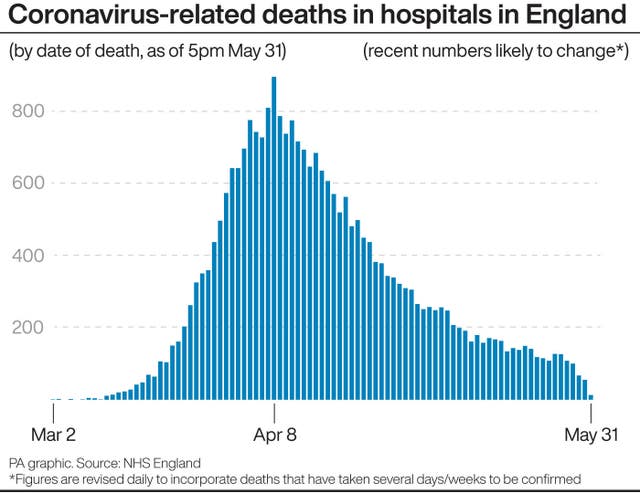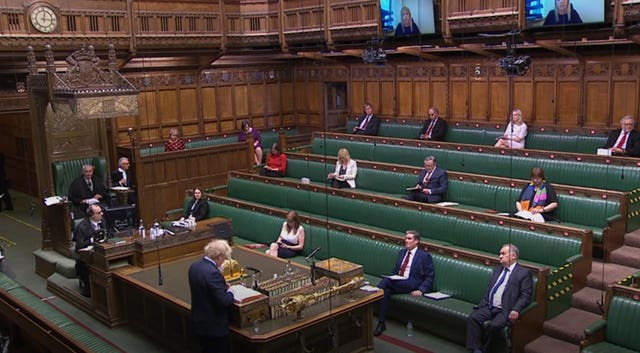Air bridges between UK and low-risk countries could be introduced at end of June
Further details are expected to be laid before Parliament on Tuesday.

Quarantine-free travel between Britain and some countries could be introduced at the end of this month if infection rates at home and abroad are sufficiently low.
The Government is understood to be considering so-called “air bridges” to enable people to travel without having to spend two weeks self-isolating on their return.
Current plans mean all international arrivals – apart from people carrying out a limited number of specified roles – would need to quarantine for 14 days from Monday.
The plan has been fiercely criticised by travel and hospitality businesses, and ministers are understood to be considering introducing air bridges when the policy is reviewed three weeks after it comes into force.
Agreements would need to be reached with other countries before any policy could be introduced. The Daily Telegraph reported Prime Minister Boris Johnson was “personally in favour” of the idea.
Further details of the quarantine proposal are expected to be laid before Parliament on Tuesday.

The Guardian reported quarantined travellers would be able to go food shopping, change accommodation and use public transport from airports.
But a Government source said people would be expected to stay in one home, use private transport and only venture outside where absolutely necessary.
It comes as MPs return to Westminster after the Government dropped virtual proceedings, despite concerns that shielding politicians would be unable to attend.
The Government has tabled a motion preventing the resumption of virtual voting that allowed MPs to have their say from afar during the pandemic, but opposition parties are seeking to retain it.

In other developments:
– A new study suggested physical distancing of at least one metre lowers the risk of coronavirus transmission, but two metres could be more effective.
– A poll found 48% of Britons have been exposed to misinformation about Covid-19 online, prompting calls for health officials to “step up” efforts to combat the spread of so-called fake news.
– The total number of UK deaths involving Covid-19 continued to rise above 48,000.
As lockdown restrictions were eased and thousands of young children in England returned to primary school on Monday, the Government sought to defend its test and trace system.
Health Secretary Matt Hancock said the contact-tracing system was “up and running” and was “successful” following reports of problems with technology and staff saying they were being paid up to £27.75 per hour for doing nothing.
Asked during the daily press briefing why some contact tracers had no work, Mr Hancock said 25,000 had been hired and it was a good thing there were so many.
“It’s successful, I’m very glad to report that those who are asked to isolate by the contact tracers are expressing the willingness to do so and we track that very carefully,” he said.
“The level of incidence of disease has come down and so actually we have more capacity than we need, this is a good thing.
“I think to err on the side of having too many contact tracers is the right side to err on. I’d rather have too many people trained and ready to go.”
Professor John Newton, the Government’s testing coordinator, said the system was working well, adding: “We do have a lot of capacity.”
But one nurse working as a contact tracer told the PA news agency the necessary systems were “not in place”.
Meanwhile a Public Health England review into why coronavirus is disproportionately affecting BAME communities is facing delays, according to reports.
The study had been due to be published by the end of May but Sky reported it was being held back because it had not been peer-reviewed and it would be a “bad combination” to release the findings alongside worldwide outrage over the death of African-American George Floyd, which has sparked race riots in the US.
Labour MP Marsha de Cordova, the shadow women and equalities secretary, said a delay was “unacceptable” and urged the Government to give BAME communities answers.
“If anything, recent events make the release of this report all the more urgent,” she said.
“If the government is serious about tackling racial injustice, they should not be shying away from understanding into why these injustices exist.”
A Public Health England spokesman said: “The review will be published shortly.”





